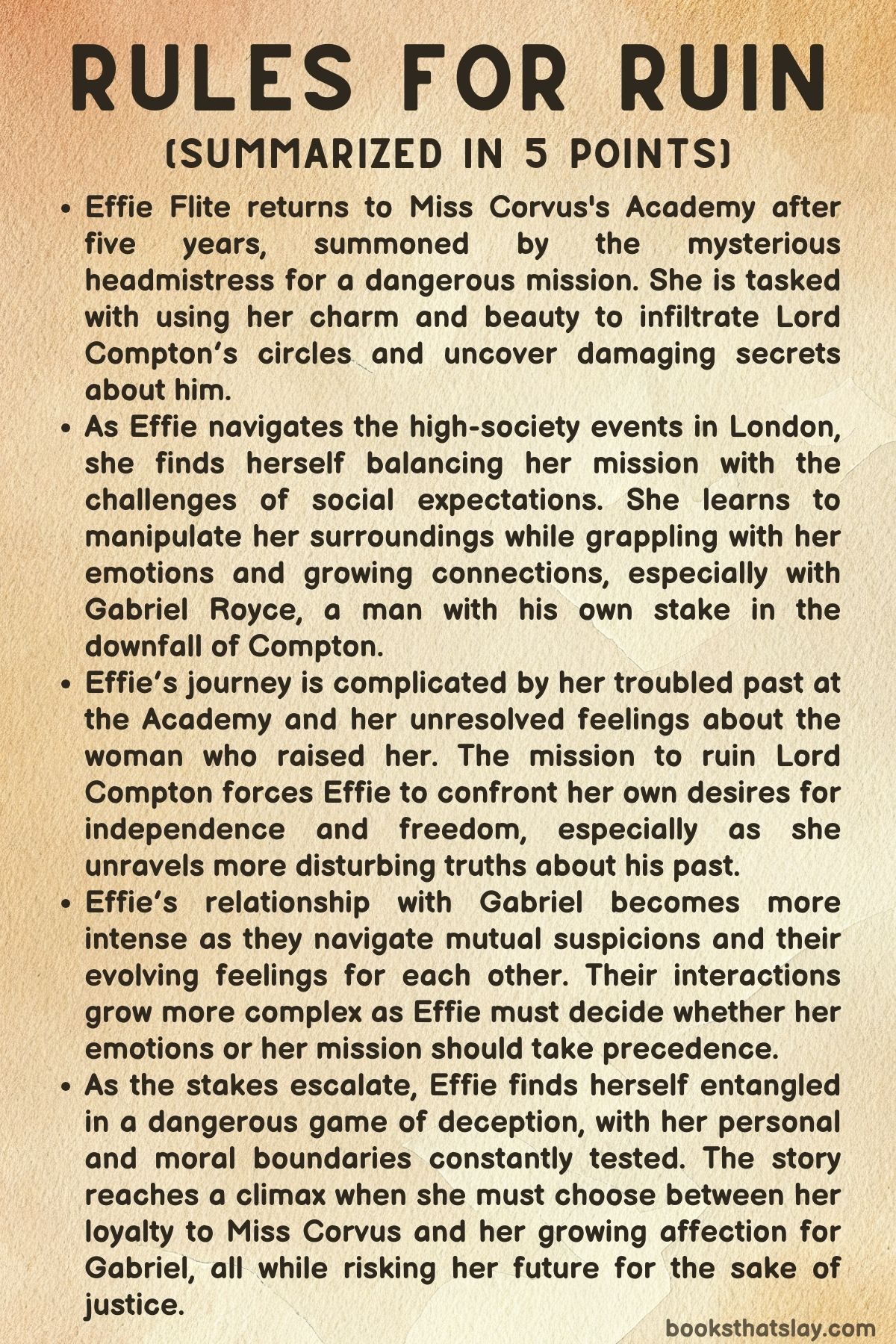Rules for Ruin Summary, Characters and Themes
Rules for Ruin by Mimi Matthews is a historical fiction novel set in Victorian London, exploring themes of love, power, and personal redemption. The story follows Effie Flite, a woman caught between her past at the Benevolent Academy and her future in the treacherous world of high society.
After being summoned back to the Academy by the cold and calculating Miss Corvus, Effie is tasked with taking down Lord Compton, a powerful and corrupt aristocrat. As Effie navigates social events and forms complicated relationships, she discovers dark secrets about Compton, her own past, and the people she’s become entangled with, including Gabriel Royce, a man with his own agenda. Rules for Ruin is a tale of intrigue, personal growth, and the pursuit of justice, set against a backdrop of societal expectations and the fight for freedom.
Summary
Effie Flite, a woman with a complicated past, returns to the imposing gates of Miss Corvus’s Benevolent Academy five years after her expulsion. The Academy, which she had once seen as a prison, calls her back for a mission that could change her life.
Effie’s task is clear: to ruin Lord Compton, a wealthy and powerful figure in British society, by exposing his hidden past. Miss Corvus, who had shaped much of Effie’s life, offers her freedom and a large sum of money if she succeeds.
Effie’s mission is fraught with danger, but she is determined to see it through, driven by a deep-seated need for independence.
Effie’s arrival at the Academy is met by Penelope Trewlove, or Nell, a former companion and teacher at the institution. Together, they go to Miss Corvus, who is now frail after a long illness but still maintains her commanding presence.
Miss Corvus reveals the details of Effie’s task: infiltrate the social circles of Lord Compton, uncover evidence of his wrongdoings, and destroy his reputation. The stakes are high, and Effie’s loyalty to Miss Corvus is put to the test as she embarks on this mission to settle her debt.
In London, Gabriel Royce, a self-made man from the slums, also finds himself entangled in Compton’s schemes. Gabriel, with little respect for the aristocracy, is focused on bringing down Compton, whom he views as a fraud.
At a ball, he and Effie have a brief but charged encounter, although they do not speak directly. Gabriel is intrigued by Effie, sensing that she might be more than she appears.
Afterward, he begins to plot his own strategy to expose Compton.
Effie’s time in London is spent attending high-society gatherings, making connections, and searching for the necessary evidence to ruin Compton. Despite her beauty and outward refinement, Effie is sharp, clever, and aware of the power she holds in society.
Her charm allows her to blend into the circles she needs to navigate, but her ultimate goal remains clear: to take down Lord Compton and gain her freedom. Throughout this journey, Effie’s awareness of her own power and potential grows, as does her understanding of the complex social structures that govern her world.
Effie’s mission, however, is complicated by her relationship with Lady Belwood, a host who becomes increasingly suspicious of Effie’s ties to the Academy. Effie’s years spent in Paris, as well as her education at the Academy, have shaped her into a resourceful and capable woman, one who can manipulate her circumstances to her advantage.
But as she gets closer to her goal, she faces emotional and moral dilemmas, particularly regarding her loyalty to Miss Corvus and the ethics of her mission.
Effie’s entanglement with Gabriel deepens as they cross paths more frequently. Gabriel is determined to take down Compton, but his motives are unclear, and Effie is wary of his true intentions.
Despite their tension, there is an undeniable attraction between them, which complicates Effie’s mission. She must stay focused on her task, but the growing emotional connection with Gabriel presents a challenge.
As Effie continues her mission, she uncovers shocking revelations about Compton’s past, including his involvement in a young woman’s disgrace and his possible connection to Miss Corvus. These discoveries make her question her understanding of right and wrong, forcing her to confront uncomfortable truths about her own past and her connection to the Academy.
Meanwhile, Gabriel, who is involved in the underworld and has his own reasons for wanting to see Compton brought down, begins to play a more active role in Effie’s mission. Their relationship becomes increasingly fraught as Gabriel holds vital information about Compton’s past, yet refuses to share it with Effie.
This betrayal causes a rift between them, and Effie is forced to navigate her growing feelings for Gabriel while remaining focused on her goal.
The story reaches a critical point when Effie’s investigation leads her to a grand dinner at Compton’s estate. Here, she confronts Lord Compton and the dark truths of his manipulations.
The power dynamics at play become clearer as Effie realizes that her future is tied to the success of her mission. The revelation of Compton’s past is not only a personal victory but also a chance for Effie to claim her independence from the controlling forces that have shaped her life.
Effie and Gabriel’s relationship reaches a turning point as they confront the emotional and physical dangers that have defined their interactions. Gabriel’s feelings for Effie become undeniable, but she remains focused on her mission, despite her growing affection for him.
The tension between them is palpable, and Effie must decide whether to trust Gabriel or continue on her own.
In the final moments of the story, Effie’s resolve is tested. She is forced to confront the emotional turmoil Gabriel has caused, yet she remains determined to see her mission through.
The stakes are high, and Effie understands that her future depends on her ability to expose Compton’s wrongdoings. As she faces the dangers ahead, Effie steels herself for the challenges that await her, knowing that the road to freedom is fraught with sacrifices.
Despite the obstacles in her path, Effie ultimately succeeds in bringing Compton to justice. The revelations about his past, brought to light through the efforts of Gabriel and a determined journalist, lead to his downfall.
With Compton out of the picture, Effie and Gabriel can finally focus on their future. Two months later, they are married, their love strengthened by the trials they have faced.
Gabriel has become involved in social reform, particularly in the Rookery, a slum area that holds painful memories for Effie. As they settle into their new life, Effie and Gabriel are ready to face whatever challenges come their way, their bond stronger than ever.

Characters
Effie Flite
Effie Flite, the protagonist of Rules for Ruin, is a woman defined by her past and the complex web of relationships that shape her future. Raised in Miss Corvus’s Benevolent Academy, an institution that molded her into a woman of skill and intelligence, Effie carries the emotional scars of her upbringing.
She harbors a deep resentment for the Academy, yet her loyalty to Miss Corvus, the woman who controlled much of her life, is undeniable. Effie’s mission to bring down Lord Compton, a corrupt and powerful figure in British society, becomes not just a personal vendetta, but an opportunity for freedom and redemption.
While her beauty and charm serve as tools to infiltrate high society and manipulate her surroundings, it is her inner strength and cunning that allow her to navigate the treacherous world she inhabits. Throughout the narrative, Effie grapples with her emotions—especially her growing attraction to Gabriel Royce, a man who complicates her mission.
Despite the tension between her feelings for him and her devotion to the mission, Effie remains resolute in her pursuit of justice. Her journey is one of self-discovery, as she learns to balance her independence with the moral complexities of the task at hand, all while seeking a sense of belonging in a world that has long sought to control her.
Gabriel Royce
Gabriel Royce is a self-made man, having risen from the slums of St. Giles to establish himself in London’s political and social circles.
His personal stake in bringing down Lord Compton is rooted in a desire to right the wrongs of the corrupt aristocracy, a class he has little respect for. Gabriel’s complex relationship with Effie is at the heart of much of the novel’s tension.
Initially intrigued by her intelligence and composure, he becomes more entangled with her as the story progresses. However, his hidden motives and his involvement in concealing vital documents about Compton complicate their relationship.
Gabriel is driven by a need for control and power, and his actions—though seemingly protective—ultimately betray Effie. Despite this, his affection for her grows as they share moments of vulnerability and intimacy, particularly during their perilous encounters.
Gabriel is a character torn between his feelings for Effie and his pursuit of his own goals, and his internal conflict adds depth to his character. By the end of the story, Gabriel’s love for Effie becomes a central force in his transformation, as he is willing to risk everything for her safety and their future together.
Miss Corvus
Miss Corvus, the headmistress of the Academy where Effie was raised, is a commanding and enigmatic figure. Though frail and weakened by illness, her presence continues to dominate Effie’s life, shaping much of her past and present.
Miss Corvus is a woman of sharp intellect and ruthless determination, whose manipulation of Effie serves as both a means of control and a way to achieve her personal revenge against Lord Compton. Her decision to enlist Effie in a mission to ruin Compton and expose his secrets reflects her deep-seated desire for justice, even at the cost of Effie’s emotional well-being.
Throughout the story, Miss Corvus remains an ambiguous figure—both a mentor and a manipulator. Her control over Effie is rooted in a sense of power, but it also stems from a complex bond forged in the crucible of the Academy.
As the story unfolds, Miss Corvus’s role in Effie’s life becomes increasingly complicated, and Effie must ultimately decide whether to remain loyal to the woman who shaped her or to strike out on her own and seek a future free from Miss Corvus’s influence.
Lord Compton
Lord Compton is a figure of power and corruption, whose actions set the stage for much of the novel’s intrigue. A wealthy aristocrat with a tarnished reputation, Compton’s connection to Effie’s past is one of betrayal and deceit.
His mistreatment of Elizabeth Wingard, a woman he once jilted, and his ruthless political maneuvering make him a villain at the heart of Effie’s mission. Compton’s cruel and condescending attitude toward women, combined with his hidden ties to the world of manipulation and fraud, make him a dangerous and morally bankrupt character.
As Effie uncovers more about his past, Compton’s true nature is revealed, and his role in the story becomes increasingly central to Effie’s drive for justice. His relationship with his daughter, Carena, further underscores his manipulative tendencies, as he seeks to control those around him for his own gain.
Ultimately, Compton’s downfall is the result of Effie’s efforts, and his exposure reveals the depth of his depravity.
Lady Belwood
Lady Belwood is a character who represents the aristocratic world that Effie finds herself navigating. As Effie’s host during her time in London, Lady Belwood serves as both a source of comfort and a reminder of the societal expectations placed on Effie.
Her relationship with Effie is tinged with suspicion, as Lady Belwood becomes increasingly anxious about Effie’s connection to Miss Corvus and the Academy. While Lady Belwood seems to have the outward appearance of a benevolent host, her underlying motivations remain unclear, and Effie is wary of the potential dangers she represents.
Lady Belwood’s role in the story is one of subtle manipulation, as she tries to exert control over Effie while also grappling with her own fears and insecurities. Despite her outward calm, Lady Belwood is a reminder of the complex social hierarchies that Effie must navigate in her quest for justice.
Penelope “Nell” Trewlove
Penelope Trewlove, or Nell, is Effie’s former companion from the Academy, and her role in the story is one of both friendship and tension. Nell, who remains a teacher at the Academy, is a stark contrast to Effie in terms of her emotional connection to the institution.
While Effie views the Academy as a prison and a source of her emotional wounds, Nell seems to have found a sense of belonging within its walls. Her reunion with Effie is brief but significant, as it highlights the contrasting paths the two women have taken since their time at the Academy.
Nell’s loyalty to Miss Corvus and her continued involvement with the Academy place her at odds with Effie, whose mission to destroy Compton is rooted in a desire for freedom and self-determination. Despite this, Nell’s presence serves as a reminder of the past that Effie is trying to escape, and her role in the story is one of both support and subtle conflict.
Themes
Power and Manipulation
In Rules for Ruin, power dynamics and manipulation are central themes that shape the characters’ actions and the overall narrative. Effie Flite, the protagonist, is initially introduced as someone under the control of Miss Corvus, the headmistress of the Academy.
Miss Corvus embodies a form of institutional power, exerting authority over Effie’s life by shaping her education and future. Despite Effie’s eventual expulsion, she cannot escape the shadow of Miss Corvus, who holds a great influence over her, compelling Effie to return for a mission.
This establishes the theme of manipulation from the outset, where characters are pulled by forces beyond their control. Lord Compton, a figure of wealth and power, becomes another symbol of manipulation.
His political influence and social standing give him the ability to dominate those around him, and he exploits this to further his own agenda. Effie’s mission, to expose Compton’s hidden past, brings her into direct confrontation with this manipulative power.
The theme of manipulation is not just limited to physical or emotional control but extends into the social realm as well, where the characters must navigate a complex web of societal expectations, personal ambitions, and moral compromises.
The manipulation in the story is not only exerted by external forces but is also internalized by the characters. Effie, who was raised in an environment of control, has learned to use her beauty and intelligence as tools to manipulate the social situations around her.
She plays the role of a refined lady, concealing her true intentions while seeking to expose Compton’s secrets. This ability to manipulate perceptions and control social dynamics becomes a source of power for her, enabling her to infiltrate the upper echelons of society.
However, Effie also grapples with the moral implications of using such manipulation for personal gain. The theme of power and manipulation is thus explored from multiple angles: as an external force that dictates the lives of the characters and as an internal strategy employed by them to achieve their goals.
Identity and Self-Discovery
The journey of self-discovery is an essential aspect of Rules for Ruin, particularly for Effie Flite, whose sense of identity is shaped by her past and the expectations placed upon her. Effie’s return to the Academy, an institution that once imprisoned her, brings back memories of a time when she felt powerless and abandoned.
However, over the course of the story, Effie begins to evolve into a woman who is aware of her strength and capabilities. Her journey through London’s high society, where she is forced to maintain a facade while secretly working to destroy Compton, represents her search for a personal identity independent of the forces that have controlled her.
Effie’s mission and her interactions with others, especially Gabriel Royce, force her to confront not only the external expectations placed upon her but also her internal conflicts. She must balance her loyalty to Miss Corvus, a woman who represents the only semblance of family she has, with her growing awareness of the power dynamics and manipulations at play.
Her time at the Academy, her time in Paris as a lady’s companion, and her encounters with high society allow her to slowly piece together who she truly is—someone capable of influencing others, of making her own decisions, and of navigating a world that has long kept her in a subordinate position.
Gabriel Royce acts as a catalyst for Effie’s self-discovery. While he represents a potential romantic interest, he also forces Effie to reconsider her values, especially regarding trust and loyalty.
Their interactions challenge Effie’s beliefs, particularly when she uncovers the hidden truths about his involvement with Compton. In confronting these revelations, Effie is forced to reevaluate her feelings for Gabriel and what it means to be true to herself.
Ultimately, Effie’s growth lies in her ability to reconcile her mission with her personal desires, to navigate between her past as a controlled orphan and her future as a woman with agency.
Morality and Justice
The theme of morality and justice in Rules for Ruin is central to Effie’s quest to uncover Lord Compton’s hidden past. Throughout the story, Effie’s moral compass is tested as she grapples with the ethical complexities of her mission.
Initially, her mission seems straightforward: to bring Compton to justice by exposing his wrongdoings. However, as she delves deeper into his life and the political intricacies that surround him, Effie is forced to confront the gray areas of morality.
Her role in manipulating people, using her beauty and charm to infiltrate Compton’s circles, raises questions about the ethics of her actions. Effie is not the typical heroic figure but rather someone who navigates the world of high society by using the very tools that often victimize others.
Her complicated relationship with Gabriel Royce further complicates the theme of justice. While Gabriel appears to be on the side of justice, his own actions and motives are clouded by personal interests.
He possesses critical documents that could destroy Compton, yet he refuses to give them to Effie, complicating her efforts. Gabriel’s reluctance to share these documents with her highlights the theme of selective justice—where individuals choose which truths to expose based on personal gain or feelings of control.
As Effie navigates the moral landscape of her mission, she must wrestle with her own desire for revenge against Lord Compton and the broader societal forces that enable his corruption.
Effie’s struggle to maintain her integrity while simultaneously carrying out a mission filled with deception and betrayal showcases the tension between personal justice and the larger societal injustices at play. Her journey is one of balancing her own values with the need for retribution against those who abuse their power.
Ultimately, the book questions whether true justice can ever be achieved in a world filled with moral ambiguity and whether the pursuit of justice is worth the personal cost.


